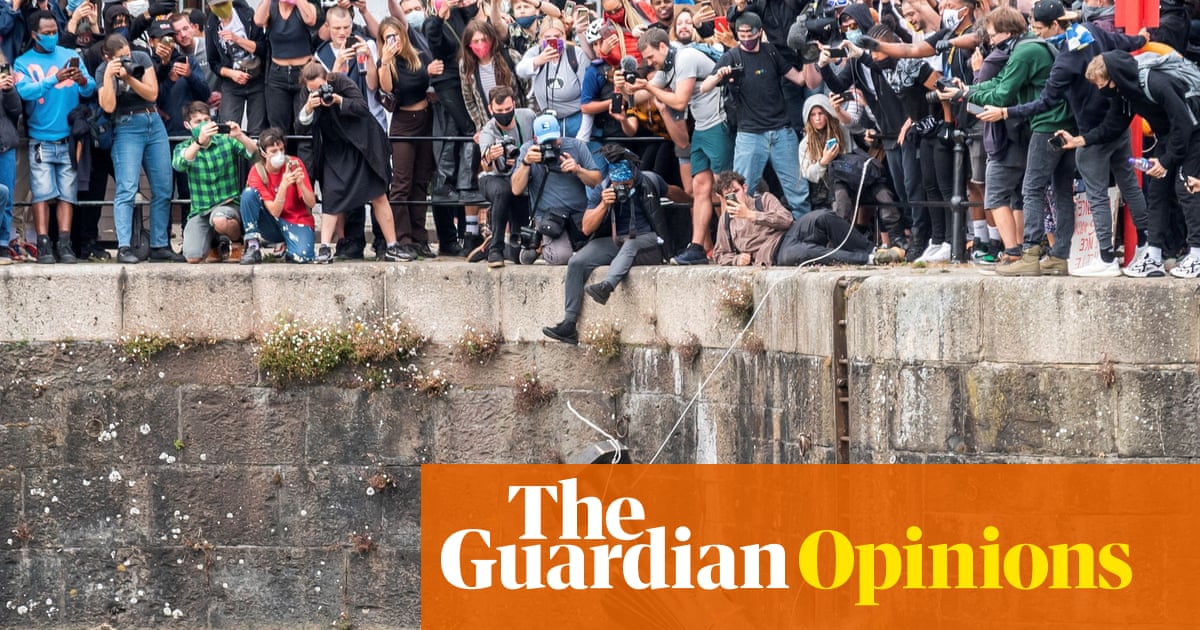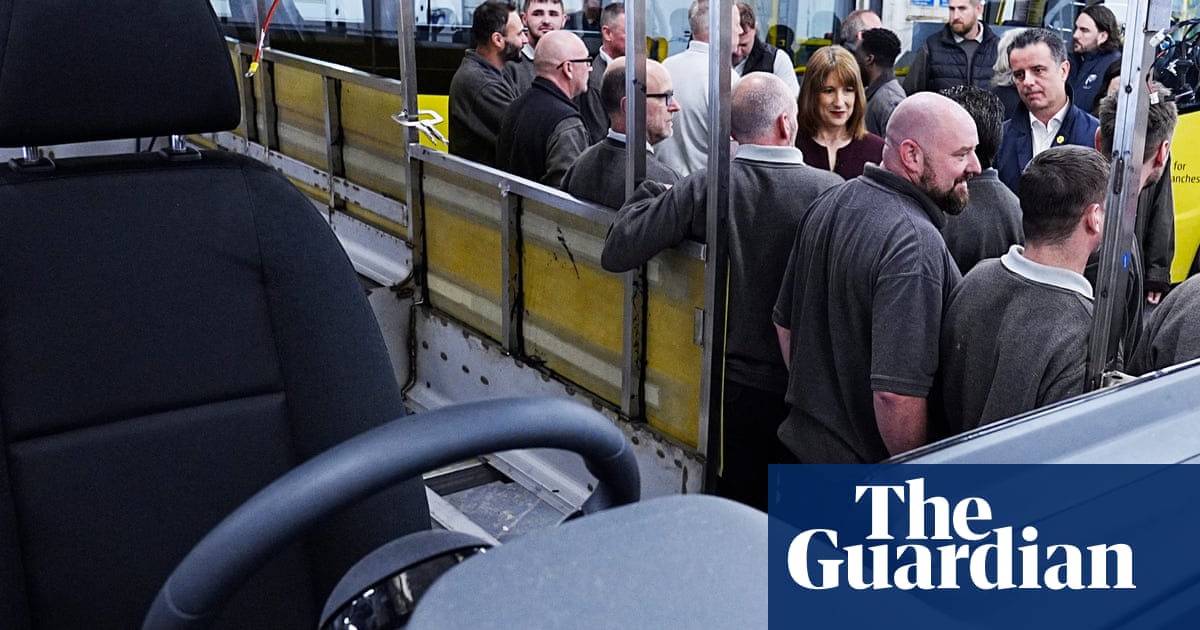The most newsworthy thing Ed Davey could have done last week would have been to turn up to his local election campaign launch in a boring suit and stand in front of a load of party placards to give a speech about voting for change in your community. Given the Lib Dem leader’s proclivity for election campaign stunts, it would have been a man-bites-dog level of surprise that he was no longer prepared to charge around in fancy dress while trying to get attention for his party’s message.
Of course, he didn’t do that: the man in a boring suit talking about change was Keir Starmer, while Davey chose to ride a hobby horse. His message from the back of the toy horse was that the Liberal Democrats are in a “two-horse race” with the Tories in many of the English council seats up for grabs in May. But he also argued that the Lib Dems were the “natural home” for voters who were fed up with Labour. His party is hoping it can hoover up more voters in the “blue wall” of the home counties where the Conservatives have alienated reasonably centrist middle-class types both by being incompetent in government and lurching right.
Tory election expert Robert Hayward also suggests Davey’s party may want to expand into areas that Labour won in July 2024’s general election “but which are not parts of their natural territory”, such as in Oxfordshire and Cornwall. He expects them to quietly pick up county council seats and control of local authorities “without being the main story”.
The Lib Dems have long been happy to not be the main story, benefiting as a protest vote party from whoever is getting the headlines for making a mess. But the profile of that protest voter has changed, and so Davey and colleagues have adapted their messaging. Back in the 2010s, the party was more likely to have purchase among the kind of people who might, on another day, vote Ukip: working-class or lower-middle-class people who were uncomfortable with the way the country was changing.
Inside the party, there was confusion when they discovered that some of their voters were moving to Ukip: how was this possible when they seemed to be so diametrically opposed politically? They held focus groups with these switchers, which those present recalled as some of the angriest they had sat through (quite an achievement given the level of fury at the time about the party’s U-turn on tuition fees). In one session, a strategist interrupted and asked whether there was anything these voters liked about Britain. The reply was telling: “Its past.”
Today, the voters Davey is after are still worried about where things are going, but in a more global sense. They are still protest voters, but of the sort who listen to Alastair Campbell and Rory Stewart protesting on The Rest Is Politics podcast about the mistakes the government is making. The party feels it is appealing to a new cohort of voters in affluent parts of Oxfordshire and Surrey who have voted Conservative all their lives but who feel left behind by their former choice. They are more internationalist, upscale, traditionally Tory voters with grownup children who live in flats affected by the cladding crisis.
To suggest he is speaking for these new voters Davey has moved on from talking about Brexit (so last decade) to pushing Keir Starmer about his relationship with Donald Trump in order to express that discomfort with the way the world is going. Almost every week at prime minister’s questions and in other sessions in the Commons, Davey asks Starmer to take a harder line on Trump.
The US president is so important to his messaging that the Lib Dem leader no longer asks about social care as much as he used to. Social care did, though, have the same function as Trump has now: it contrasts with the hobby horse stuff to show that Davey has a serious side as well as the attention-grabbing stuff. It helps that Kemi Badenoch has had a niche approach to PMQs, often leaving the field clear for Davey – and, more recently and surprisingly, the SDLP, to ask the really difficult questions.
Now, as revealed in this paper today, the party is calling for a vote in parliament on any trade deal between the UK and US. The tactic would force Labour MPs in traditionally non-Labour rural areas to appear to take a side against their already angry farming constituents – as well as making the Tories take the same uncomfortable choice in public. It is an effective approach, as it pitches the Lib Dem protest mentality against the necessity for the government to be pragmatic. At no point does Davey have to make the argument that of course the UK has to talk to the US because he is not in government or pretending to be a party of government. He wants to pitch the Lib Dems as a campaigning force in politics, speaking up for the voters the establishment parties are ignoring.
after newsletter promotion
But the Lib Dems have nonetheless become more pragmatic, too. They were mocked back in the 00s for having a “goldfish policy” (a motion passed at conference calling for a ban on live animals as prizes), but even a decade ago, their defence policy could largely, and not particularly unfairly, be characterised as wishing we all just got along better. They opposed full renewal of the Trident nuclear deterrent. Now, their manifesto position is that they support four submarines and the continuous at-sea deterrent of having at least one of those boats in the seas at any time. They talk a lot more about defence in terms of higher spending and support for the armed forces. This is in part because they have six MPs with military backgrounds and because the world really has changed. But it is also because the party sees what insiders call “quiet patriots” as a key voter group to appeal to. They want to target people who feel strongly that someone should be standing up for the national interest, but not in the tone adopted by Nigel Farage.
The Trident policy change passed Badenoch by: recently, she claimed the Lib Dems had a lot of “silly and foolish ideas” including that they “don’t want us to keep, maybe, a nuclear deterrent”. Mind you, in the same interview, she also described a “typical Liberal Democrat” as “somebody who is good at fixing their church roof”. She was mocked at the time, but it was a good illustration of the impact the Lib Dems have had on politics more widely. They have always seen community politics (and more recently, fancy dress) as the way of attracting voters’ attention.
That focus on the local has gone mainstream in politics in recent decades, to the extent that MPs from all parties regularly lobby for more funding for constituency staff, often to take on casework that should really be dealt with by a local councillor, not a member of parliament.
This is not, by the way, a wholly good thing: while a deep local involvement keeps them in touch and empathetic to their constituents, MPs are legislators first and foremost and yet are devoting more time and resources to local issues that could often be prevented in the first place if parliament did a better job of scrutinising legislation.
Constituency work is not finite: it is more like expanding foam and will quickly fill the capacity created by more staff, meaning those MPs will be back for more workers in a few years’ time. All driven in part by a fear that, if they aren’t seen to be fixing the church roof, then they will lose to their opponents, especially the Lib Dems. So in a sense, Ed Davey’s party is at least partly to blame for politics becoming less about the business of getting things done nationally and more about how intimately involved you are with your local drainage issues.
Speaking of drainage issues, Davey will be performing more stunts in the local election campaign like his famous Windermere paddle board fall. He knows his party won’t be the main story of the locals, but that doesn’t mean it won’t continue to hold more sway over the discourse than many realise.

.png) 2 months ago
35
2 months ago
35

















































